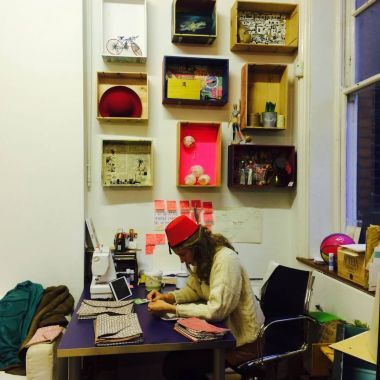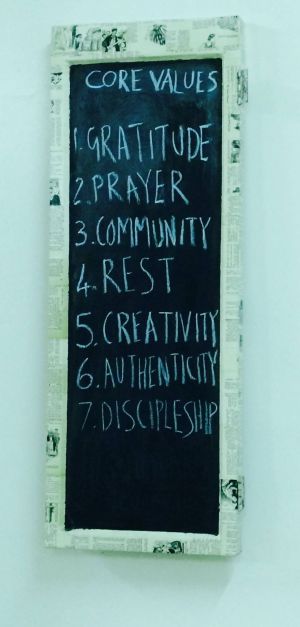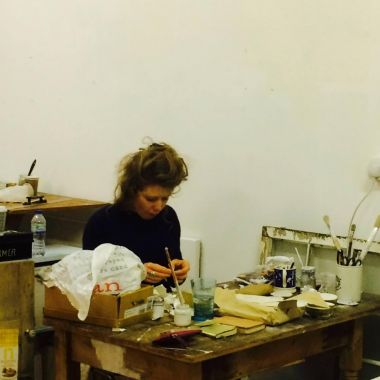Community living in Clapham: The Common Room
I find Thea Gormley sitting in the corner of the large basement wearing a fez while stitching buttons onto the laptop covers she creates from material discarded from high end fabric brands.

A little more than a year ago this church-owned Clapham basement was an unused shell with yellow walls, frequented by drug addicts and at high risk from squatters.
Today Gormley and others have transformed the space into a creative's dream. A mishmash of furniture, all found on the streets and 'restored and redeemed' by licks of paint fill the space, creating an inviting working space with a difference. The Common Room is a community and has become church for those who work and spend time there.
Built into the working week are set rhythms of prayer, worship and gratitude. No one is forced to join in, but it is encouraged. Thea and Kate Wilks – who has been a part of The Common Room since its inception – speak of the challenges and the joys of living intentionally in what they describe as "covenant relationship".
"We do life together," Thea explains. "Eating together, praying together, worshipping together, working together. And that seems to be the way that community is built, as well as actually doing life. Because you are interacting on quite a real plane, rather than simply meeting for an hour-long coffee date."
During its lifespan The Common Room has had a steady flow of members, including creatives working alone and small charities and ministries using the space.
Kate says she "battled with" the structures surrounding the community at first, but that "at the same time, I'm realising how grateful I am and how important that structure is. I think we have all been challenged, all changed. You realise that as well as a cost there is great benefit to these structures."
Building community "is a journey that pushes on everyone's buttons", says Thea. "It is inherently challenging, but a good thing. We have dreams of living together and working collaboratively on projects – all of that stuff is going to necessitate really good dialogue."
Although this image of community living sounds so attractive, the reality is that it hasn't come easily. There's been a lot of 'stuff' to work out, and a lot of uncomfortable and honest conversations had in order to nurture The Common Room community.
To create such an environment, it's has drawn up seven core values.
1. Gratitude

Thea described how the Common Room has become "obsessed" with gratitude. Every Thursday they meet at the end of the dayand write down and share three things each were grateful for that week.
"We have kept all the gratitude lists we've written," Thea says, going over to the cupboard and picking up a huge pile of different scraps of paper filled with writings. "Oh wow, someone's written that they're grateful for my hands!"
2. Prayer
Prayer is central to the rhythm of life in the space. As well as having scheduled prayer meetings twice a week before the work day begins, prayer and worship come into daily life.
Worship music is usually on in the background and the collaborative environment enables people to pray throughout the day if they want.
Just before I arrived there was "an awesome impromptu worship time after lunch".
3. Community
The Common Room is clearly all about building community. Although prayer and worship are a central part of this, its vision is to be inclusive of those without a faith as well, somehow managing to balance being a community that worships with being inclusive of those who do not.

"The only bit where it can be hard is when we play worship music or something, but I'll always chat to them and ask, and usually they are happy," Thea says. "The people who have been here are really open and up for stuff. The type of people this has attracted have been interested in community and up for wanting to contribute; up for things being messy around the edges as we work it out together.
"It's been a natural way to engage people with faith, not in an organised way."
"Just being here in a day and being able to talk – discussing things and inspiring each other builds community; it's just so free," Kate added.

4. Rest
The Common Room is tucked away just north of Clapham Common, yet when you walk in any sense of busyness evaporates. The space emanates a peace that is hard to come by in London.
"We are here, in the middle of London, making our stuff for £100 a month for a desk. That is so rare and it takes the pressure off the ratrace that London can be."
Rest, Thea elaborates, is "not inactivity, but rest from our enemies".
"It talks about how in the Old Testament they would rest in their camp – they were still doing stuff, like fixing their armour, but they weren't at battle. So what does it look like to be doing that here? Part of it is the safety of these covenant relationships where you're known, loved and accepted because you are not fighting that battle of proving yourself and playing games that so many people have at a workspace.
"The cool thing here is that the workplace is a safe place and so hopefully the work and the calibre of the work that comes out of it will be totally different. It is a wholesome and sustainable thing – rather than having to put on a brave face all day long. We have to check in so many times a day, praying together, enabling life to be sustainable.
"It's not about survival, it's about nourishing and growing in the safety of a loving place where you can put your guard down, not trying to prove something.
"That has been a real treat."
5. Creativity
Creativity is at the heart of The Common Room. It seeks to transform the image of the solitary tortured artist through providing a space where creativity can be collaborative. The pioneers have been intentional about creating rhythms that encourage stability in which to create from – with regular opening times and eating together – that subvert the idea of creativity being insular.
"Going to a studio and being left just with your art and your thoughts – being liberated from that by getting out of your own head and engaging with others. The self-worth of getting dressed," Thea says.
"It is massively conducive to creativity. But then there are distractions, it's unpredictable, but the pay-offs of that are large."
6. Authenticity
The journey to authenticity is rarely a comfortable one, and the experience of this community has not been any different. They have had to endure a steep learning curve and engage in those "uncomfortable conversations" to build relationships that see beyond what one might want to present.
"We are all wanting to be known and loved", Thea says. "You can't actually be loved until you're known because they are not actually loving you for the real you. So this has been an awesome, safe place to let ourselves be known and let ourselves be loved into fullness."
7. Discipleship
Alongside community and authenticity, the Common Room has a vision for being a place of growth, in which people are both challenged and encouraged. Through relationships, living together and working together on a daily basis, a lot of this has happened organically. However, over the last few months, the NowBelieve team – a group of evangelists – has been running the Good News Academy from the Common Room space, which has been a "foray into something more strategic".
**
The Common Room is more than a co-working space, it is an experiment in intentional communal living in the heart of London; a group of people choosing to set the pace rather than be dictated to by the world around them.
"I think it really is church. I think it is a very true expression of church that has been a joy to be a part of. It has been a joy to be part of it, like praying happens together all through the week, rather than just on Sundays", Thea says.
The Common Room in its current form was always a pilot. Thea and Kate knew the building that they were existing in was due to be reclaimed for community work by Holy Trinity Clapham. The community in its current form is closing in the coming weeks, but the lessons learnt in its building will not be unlearned and the relationships built will not be undone.











